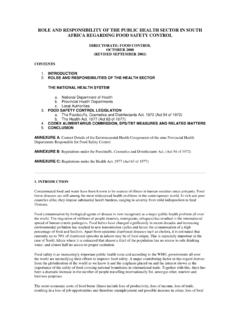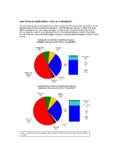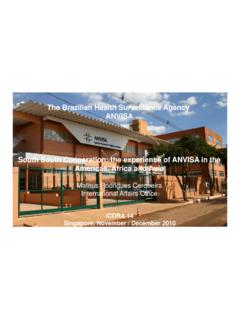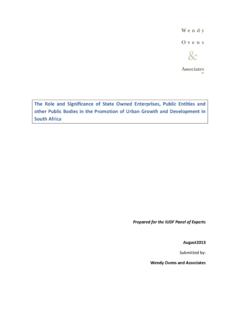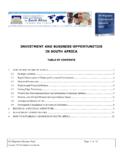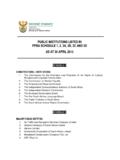Transcription of ROLE AND RESPONSIBILITY OF THE PUBLIC …
1 ROLE AND RESPONSIBILITY OF THE PUBLIC health SECTOR IN south africa regarding food safety control DIRECTORATE: food control OCTOBER 2000 (REVISED SEPTEMBER 2002) CONTENTS 1. INTRODUCTION 2. ROLES AND RESPONSIBILITIES OF THE health SECTOR THE NATIONAL health SYSTEM a. National Department of health b. Provincial health Departments c. Local Authorities 3. food safety control LEGISLATION a. The Foodstuffs, Cosmetics and Disinfectants Act, 1972 (Act 54 of 1972) b. The health Act, 1977 (Act 63 of 1977): 4.
2 CODEX ALIMENTARIUS COMMISSION, SPS/TBT MEASURES AND RELATED MATTERS 5. CONCLUSION ANNEXURE A: Contact Details of the Environmental health Components of the nine Provincial health Departments Responsible for food safety control ANNEXURE B: Regulations under the Foodstuffs, Cosmetics and Disinfectants Act, (Act 54 of 1972) ANNEXURE C: Regulations under the health Act, 1977 (Act 63 of 1977) 1. INTRODUCTION Contaminated food and water have been known to be sources of illness in human societies since antiquity.
3 food borne diseases are still among the most widespread health problems in the contemporary world. In rich and poor countries alike, they impose substantial health burdens, ranging in severity from mild indisposition to fatal illnesses. food contamination by biological agents of disease is now recognised as a major PUBLIC health problem all over the world. The migration of millions of people (tourists, immigrants, refugees) has resulted in the international spread of human enteric pathogens. food habits have changed significantly in recent decades and increasing environmental pollution has resulted in new transmission cycles and hence the contamination of a high percentage of food and feedlots.
4 Apart from epidemic diarrhoeal-diseases such as cholera, it is estimated that currently up to 70% of diarrhoeal episodes in infants may be of food origin. This is especially important in the case of south africa where it is estimated that almost a third of the population has no access to safe drinking water, and almost half no access to proper sanitation. food safety is an increasingly important PUBLIC health issue and according to the WHO, governments all over the world are intensifying their efforts to improve food safety .
5 A major contributing factor in this regard derives from the globalisation of the world as we know it and the emphasis placed on and the interest shown in the importance of the safety of food crossing national boundaries in international trade. Together with this, there has been a dramatic increase in the number of people travelling internationally for, amongst other, tourism and business purposes. The socio-economic costs of food borne illness include loss of productivity, loss of income, loss of trade, resulting in a loss of job opportunities and therefore unemployment and possible increase in crime, loss of food as a result of recalls and condemnations and loss of tourism.
6 It is, however, the damage that incidences of outbreaks of food borne diseases can cause to the reputation of south africa as a desirable destination for tourists and for export of foodstuffs from a food safety point of view, which are probably the most serious consequences economically. The services rendered by health authorities in south africa aimed at ensuring that the food consumers are exposed to do not cause them any harm, are generally referred to as food safety control . This can be defined as a mandatory regulatory activity of enforcement by the relevant health authority to provide consumer protection and to ensure that all foods during production, handling, storage, processing, and distribution are safe and fit for human consumption and conform to safety requirements as prescribed by law.
7 2. ROLES AND RESPONSIBILITIES OF THE health SECTOR Within the health sector, the Government of south africa has adopted the Primary health Care (PHC) approach through the National health Plan for south africa and the Reconstruction and Development Programme in 1994, and subsequently the White Paper on health : Towards a National health System, published in November 1996. The White Paper provides for the establishment of a national health system in south africa , which will in broad consist of three levels for PUBLIC health service delivery with each level responsible for specific functions.
8 THE NATIONAL health SYSTEM The following is a description of the roles, functions and responsibilities of the components of the national health system regarding , inter alia, food safety control . a. National Department of health The following broad functions as determined by the White Paper, is the RESPONSIBILITY of the Department: Overall co-ordination Determination of policy (national norms and standards) Monitoring (auditing) Supporting the provinces International liaison and co-operation The Directorate: food control , included in the Chief Directorate.
9 Pharmaceutical Policy and Planning, is directly responsible for all matters related to food safety control at a national level and addresses this through the following broad objectives within the health Sector Strategic Framework s Ten Point Plan 2000-2005 (1999): To protect consumers and facilitate trade by preparing and administering food legislation, regulations, policy documents and guidelines that are in line with international standards; To ensure safe food intake as well as compliance with legal requirements by exposure studies and monitoring/auditing programmes; To promote the health of people by informing and educating consumers, industry and law enforcers; To ensure the Department of health fulfils its obligation as National Contact Point of the Codex Alimentarius Commission; and, To participate in the development of a new food control system for the country.
10 For more information on the role and responsibilities of the National Department of health regarding the control of foodstuffs, contact details are as follows: Department of health Directorate: food control Private Bag X828 Pretoria 0001 south africa Tel no: 27-12-312 0186 Fax no: 27-12-326 4374 E-mail: b. Provincial health Departments Due to the restructuring of the PUBLIC health sector implemented after the first democratic election in the country in 1994 and based on the White Paper for health food control as a component of a comprehensive Environmental health Service became the executive RESPONSIBILITY of the nine provincial health authorities.

